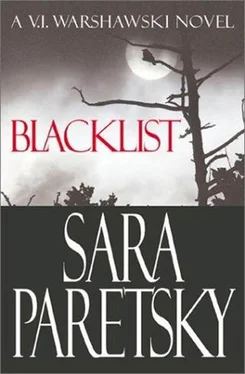I thought of my mother’s words on the worries of grand ladies. I was glad of the poverty I’d grown up in, glad of having to earn every dime I’d ever spent. You pay a high price for money, too high a price.
We fell silent while I concentrated on the road, stopping every thirty or forty miles to clean the headlights. By the time we reached Wassau, it was midnight, but the snowplows were out and the road became easier to negotiate. I pulled over at a truck stop for a cup of bitter coffee and a detail map of the north woods. Back in the car, I handed the map to Geraldine and asked her to see whether she could piece together the route to the lodge. She couldn’t read the map, she said: the print was too small, even with her glasses.
She dozed off again. I had started the journey exhausted; the cones of snow swirling into the headlights hypnotized me into drowsiness. I turned on the radio, but only picked up all-night revivals of religion. I pushed the tape player in case Marc had been listening to something.
An old man’s scratchy voice came through the speakers. “Oh, no, young man, no tape recorders. You may take some notes, but no one puts my words on tape.”
A younger, deeper voice responded, “Very well, sir.”
Several loud clicks followed, and then the young man spoke again, his voice muffled. “I’m writing a book about Kyhe Ballantine. I found a letter from her to Armand Pelletier in which she mentions a meeting with you.”
The Saturn fishtailed madly. I fought for control, spinning the steering wheel in the direction of the skid. By some miracle, we ended up in the middle of the road, facing south, but we weren’t in the ditch.
“That’s Olin,” Geraldine sat up in surprise, ignoring the car’s gyrations. “And Marc Whitby,” I agreed.
I pulled over as close to the edge of the road as I could without going into the ditch and rewound the tape to the beginning. Marc apparently had put his tape recorder in his pocket or a briefcase, but hadn’t turned it off, he’d recorded the whole conversation.
Olin laughed thinly. “The Negro dancer-what was her name? Ballantine, yes, that’s right. She was very exercised. But I told her she had made a gross error in judgment if she thought weeping and shouting would change my mind: emotional women have always disgusted me. And an emotional Negress is a terrible parody of feeling.”
“Is that why you sent the letter to the university demanding that they fire her?” Marc asked. “Because her emotions disgusted you?”
The muffled mike didn’t pick up everything Olin said, so the first part of his response was missing. “The University of Chicago deserved better than the Red faculty that infested the campus in those days. She was one I could prove to have an association with a Communist front. If I could have proved it about any of the others, I would have seen that they lost their jobs, too, young man. Don’t imagine this was about race or about sex. It was about the safety of America.”
“I’ve seen the photograph-it’s in the university archives. How did you know it was Ms. Ballantine? And how did you know where it was taken? I guessed it was her troupe because the masks were like those she’d brought back from French Equatorial Africa, but you couldn’t have known that.”
“I haven’t talked about this for forty-plus years, young man. Why should I tell you?”
“Because I’m going to write about it. If you don’t tell me your story, I’ll make assumptions about what you did and why you did it, and that will be the version that the whole world will know.”
The tape was muffled here, but then Olin called out to Domingo Rivas to help him get to his desk. I hadn’t seen Marc’s tape recorder anywhere, but he must have owned a good one, because it picked up the sound of Olin’s walker tapping across the floor. Marc apparently followed him, because I could hear Rivas’s soothing murmur, “Yessir, here we go, sir, a few more steps,” and then the noises of the lock in the drawer scraping open and Olin muttering what Rivas had reported when we spoke last week: “I am old and the time for holding on to secrets is past. Even the secrets that I’ve kept from myself.”
Papers rustled. It was maddening to sit in Marc’s car and not know what he’d been reading.
After a moment, Olin said, “I signed one copy, Calvin the other. Julius Arnoff witnessed the documents and put a third copy in Lebold, Arnoff’s vaults.”
Marc exclaimed, “But why did you sign it?” “Calvin signed one copy of what?” I screeched. “Mr. Bayard sent you the photograph?” Marc said. “He gave it to me. After Llewellyn sent me to him.” “Mr. Llewellyn?” Marc echoed. “Who owns T-Square?”
“Oh, you work in his organization, don’t you, young man? I had forgotten T-square was his precious magazine. Yes, he’d signed all those checks and we had him dead to rights. Bushnell wanted to lock him up: he hated Negro agitators even more than he hated Reds, and he figured Llewellyn as a Red-and-Black agitator. But I knew what kind of slippery bastard Calvin could be, so I believed Llewellyn. We called Calvin before the committee. He sat there smiling as though he owned the world. My God, I hated that smile more than anything else about him. I let him smirk his way through his testimony, and then I made a mistake.”
Marc was too experienced a reporter to push; he waited until Olin picked up the story himself. “I confronted him after the meeting and told him we had Llewellyn’s testimony. That I was going to put it into the record the next day, that he’d bullied Llewellyn into writing those checks. Unless Calvin began naming names. And if he didn’t, he could go to prison. He said he’d have to think about it, but I knew Calvin would never go to prison. He loved himself too much-he wouldn’t make the grand gestures of people like Pelletier or Dashiell Hammett. Calvin came back to me two days later with the dancer’s photograph. And Pelletier’s name. Of course, we already had Pelletier in our sights, and we didn’t care much about the dancer.”
“Only enough to destroy her career.” Marc spoke hotly, forgetting his reporter’s facade.
“She destroyed it herself, young man, by taking part in those Communist activities. But we couldn’t prove she’d ever given them money, or been a party member, so we let her go. I told Calvin he had another day to give me some real names, and he came back in the morning-with that letter.”
“That was enough? Why did you let Mr. Bayard off the hook?” Marc sounded bewildered, as bewildered as I felt.
“It’s there in the document, young man. I don’t want to discuss it.” The tape ended soon after that, with Marc thanking Olin, and the apartment door shutting behind him. I ran the tape to the end, but there wasn’t anything else on it.
Geraldine and I stared at each other in the dark car.
“Your young man went to Renee after that, didn’t he?” Geraldine said. “Marc was careful; he wouldn’t publish anything without checking the whole story,” I agreed sadly. “If he hadn’t been such a good journalist, he wouldn’t have died.”
Someone’s Packing
At one-thirty in the morning, we finally reached Eagle River. Nothing was open, not a gas station, not even a hamburger stand. I wished I’d bought food back at the truck stop instead of the thin coffee, which had burned a hole in my stomach-and now was making me desperate for a bathroom.
Eagle River is a little resort town. It comes to life in the summer when Chicagoans by the thousands move up to their summer homes. Some return in the winter for snowmobiling, but in mid-March everything was shut up tightly as the locals rested between waves of outsiders. If we couldn’t find the lodge on our own, we’d have to wait until morning. We might even have to sleep in the car-noile of the motels we passed showed any lights.
Читать дальше












